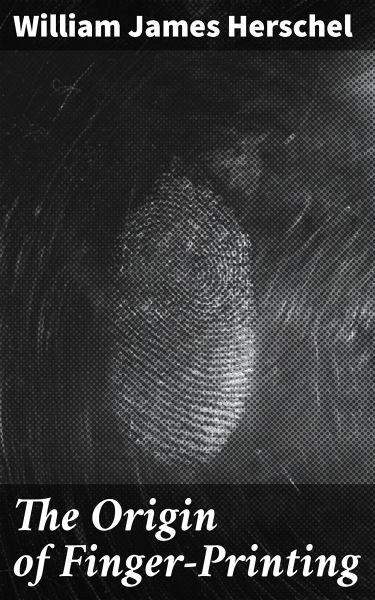
The Origin of Finger-Printing (eBook, ePUB)
Enriched edition. Unveiling the Legacy of Fingerprint Analysis
Kommentar: Gill, Morgan / Redaktion: Good Press
Versandkostenfrei!
Sofort per Download lieferbar
1,99 €
inkl. MwSt.
Weitere Ausgaben:

PAYBACK Punkte
0 °P sammeln!
In "The Origin of Finger-Printing," William James Herschel meticulously charts the development and significance of fingerprinting as a scientific method of identification. Written in the late 19th century, the book combines empirical observations with a narrative rich in historical context, illustrating how the unique patterns of human fingertips became pivotal in legal and criminological circles. Herschel's clear and concise prose highlights not just the practical applications of fingerprinting but also its implications for understanding identity and individuality within the burgeoning field ...
In "The Origin of Finger-Printing," William James Herschel meticulously charts the development and significance of fingerprinting as a scientific method of identification. Written in the late 19th century, the book combines empirical observations with a narrative rich in historical context, illustrating how the unique patterns of human fingertips became pivotal in legal and criminological circles. Herschel's clear and concise prose highlights not just the practical applications of fingerprinting but also its implications for understanding identity and individuality within the burgeoning field of forensic science. Herschel, a British civil servant and one of the early pioneers of fingerprint identification, was influenced by his experiences in India, where he first recognized the potential of fingerprints for personal identification. His keen interest in anthropology and his engagement with contemporary scientific traditions galvanized his work, positioning him at the forefront of an increasingly complex interplay between law, science, and society. This seminal work is essential for scholars and practitioners alike, illuminating the foundational principles of forensic technology. Readers interested in the intersection of science, law, and human authenticity will find Herschel's insights both illuminating and provocative, making it a critical addition to any library dedicated to the study of criminal justice or forensic methodology. In this enriched edition, we have carefully created added value for your reading experience: - A succinct Introduction situates the work's timeless appeal and themes. - The Synopsis outlines the central plot, highlighting key developments without spoiling critical twists. - A detailed Historical Context immerses you in the era's events and influences that shaped the writing. - A thorough Analysis dissects symbols, motifs, and character arcs to unearth underlying meanings. - Reflection questions prompt you to engage personally with the work's messages, connecting them to modern life. - Hand-picked Memorable Quotes shine a spotlight on moments of literary brilliance. - Interactive footnotes clarify unusual references, historical allusions, and archaic phrases for an effortless, more informed read.
Dieser Download kann aus rechtlichen Gründen nur mit Rechnungsadresse in A, B, BG, CY, CZ, D, DK, EW, E, FIN, F, GR, H, IRL, I, LT, L, LR, M, NL, PL, P, R, S, SLO, SK ausgeliefert werden.













